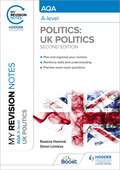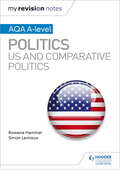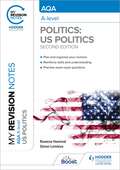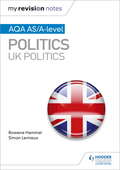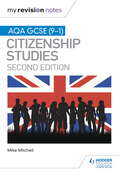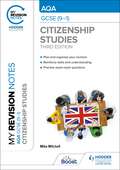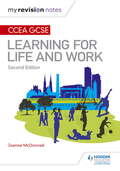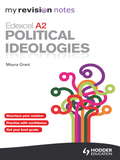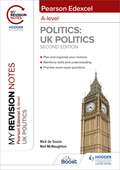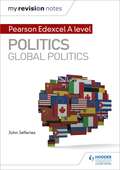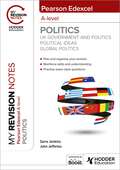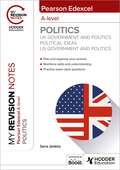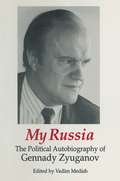- Table View
- List View
My Revision Notes: AQA A-level Politics: UK Politics Second Edition
by Simon Lemieux Rowena HammalKey content coverage is combined with practical tips to create a revision guide that students can rely on to review, strengthen and test their knowledge.With My Revision Notes every student can:- Plan and manage a successful revision programme using the topic-by-topic planner- Enjoy an interactive approach to revision, with clear topic summaries that consolidate knowledge and related activities that put the content into context- Build, practise and enhance exam skills by progressing through revision tasks and Test Yourself activities- Improve exam technique through exam-style questions and sample answers with commentary from expert authors and teachers- Get exam ready with extra quick quizzes and answers to the activities available online
My Revision Notes: AQA A-level Politics: US and Comparative Politics
by Simon Lemieux Rowena HammalWith My Revision Notes, every student can:- Plan and manage a successful revision programme using the topic-by-topic planner- Consolidate subject knowledge by working through clear and focused content coverage- Test understanding and identify areas for improvement with regular 'Now Test Yourself' tasks and answers- Improve exam technique through practice questions, expert tips and examples of typical mistakes to avoid
My Revision Notes: AQA A-level Politics: US and Comparative Politics
by Simon Lemieux Rowena HammalWith My Revision Notes, every student can:- Plan and manage a successful revision programme using the topic-by-topic planner- Consolidate subject knowledge by working through clear and focused content coverage- Test understanding and identify areas for improvement with regular 'Now Test Yourself' tasks and answers- Improve exam technique through practice questions, expert tips and examples of typical mistakes to avoid
My Revision Notes: AQA A-level Politics: US and Comparative Politics: Second Edition
by Simon Lemieux Rowena HammalKey content coverage is combined with practical tips to create a revision guide that students can rely on to review, strengthen and test their knowledge.With My Revision Notes every student can:- Plan and manage a successful revision programme using the topic-by-topic planner- Enjoy an interactive approach to revision, with clear topic summaries that consolidate knowledge and related activities that put the content into context- Build, practise and enhance exam skills by progressing through revision tasks and Test Yourself activities- Improve exam technique through exam-style questions and sample answers with commentary from expert authors and teachers- Get exam ready with extra quick quizzes and answers to the activities available online
My Revision Notes: AQA A-level Politics: US and Comparative Politics: Second Edition
by Simon Lemieux Rowena HammalKey content coverage is combined with practical tips to create a revision guide that students can rely on to review, strengthen and test their knowledge.With My Revision Notes every student can:- Plan and manage a successful revision programme using the topic-by-topic planner- Enjoy an interactive approach to revision, with clear topic summaries that consolidate knowledge and related activities that put the content into context- Build, practise and enhance exam skills by progressing through revision tasks and Test Yourself activities- Improve exam technique through exam-style questions and sample answers with commentary from expert authors and teachers- Get exam ready with extra quick quizzes and answers to the activities available online
My Revision Notes: AQA AS/A-level Politics: UK Politics
by Simon Lemieux Rowena HammalExam board: AQA Level: A-levelSubject: PoliticsFirst teaching: September 2017First exams: Summer 2018 (AS); Summer 2019 (A-level)With My Revision Notes, every student can:- Plan and manage a successful revision programme using the topic-by-topic planner- Consolidate subject knowledge by working through clear and focused content coverage- Test understanding and identify areas for improvement with regular 'Now Test Yourself' tasks and answers- Improve exam technique through practice questions, expert tips and examples of typical mistakes to avoid
My Revision Notes: AQA AS/A-level Politics: UK Politics
by Simon Lemieux Rowena HammalStudy anytime, anywhere, as you review and consolidate learning for the AQA A-level Politics Course.Ideal for home learning, this eTextbook summarises the key specification content, with activities and practice questions for students to complete independently at their own pace.With My Revision Notes every student can: - Consolidate subject knowledge by working through clear and focused content coverage- Check their own understanding through regular tasks and practice questions - with answers provided online- Pick up expert tips for improving their answers and avoiding common mistakes- Extend their learning with exam practice answers and quick quizzes available free online at www.hoddereducation.co.uk/myrevisionnotesdownloads- Ensure they've covered every topic by ticking off their progress on the revision planner
My Revision Notes: AQA GCSE (9-1) Citizenship Studies Second Edition
by Mike MitchellTarget success in AQA GCSE Citizenship Studies with this proven formula for effective, structured revision; key content coverage is combined with exam-style tasks and practical tips to create a revision guide that students can rely on to review, strengthen and test their knowledge.- Enables students to plan and manage a successful revision programme using the topic-by-topic planner- Consolidates knowledge with clear and focused content coverage, organised into easy-to-revise chunks- Improves exam technique through exam-style questions with sample answers and expert tips
My Revision Notes: AQA GCSE (9-1) Citizenship Studies Second Edition
by Mike MitchellExam board: AQALevel: GCSESubject: Citizenship StudiesFirst teaching: September 2016First exams: Summer 2018 Target success in AQA GCSE Citizenship Studies with this proven formula for effective, structured revision; key content coverage is combined with exam-style tasks and practical tips to create a revision guide that students can rely on to review, strengthen and test their knowledge.- Enables students to plan and manage a successful revision programme using the topic-by-topic planner- Consolidates knowledge with clear and focused content coverage, organised into easy-to-revise chunks- Improves exam technique through exam-style questions with sample answers and expert tips
My Revision Notes: AQA GCSE (My Revision Notes)
by Mike MitchellTarget exam success with My Revision Notes. Our updated approach to revision will help you learn, practise and apply your skills and understanding. Coverage of key content is combined with practical study tips and effective revision strategies to create a guide you can rely on to build both knowledge and confidence. My Revision Notes: AQA GCSE (9-1) Citizenship Studies will help you:- Develop your knowledge of key concepts with the latest case studies- Develop a practical understanding of key topics using activities - Avoid common mistakes and enhance your exam answers with tips- Carry out further research to take into the exam - See what you need to revise before you start answering exam questions with key points checks- Plan and manage your revision with our topic-by-topic planner and exam breakdown introduction and apply your skills and knowledge with exam practice questions and frequent Now test yourself questions, and answer guidance online- Understand key terms you will need for the exam with user friendly definitions in the glossary
My Revision Notes: AQA GCSE (My Revision Notes)
by Mike MitchellTarget exam success with My Revision Notes. Our updated approach to revision will help you learn, practise and apply your skills and understanding. Coverage of key content is combined with practical study tips and effective revision strategies to create a guide you can rely on to build both knowledge and confidence. My Revision Notes: AQA GCSE (9-1) Citizenship Studies will help you:- Develop your knowledge of key concepts with the latest case studies- Develop a practical understanding of key topics using activities - Avoid common mistakes and enhance your exam answers with tips- Carry out further research to take into the exam - See what you need to revise before you start answering exam questions with key points checks- Plan and manage your revision with our topic-by-topic planner and exam breakdown introduction and apply your skills and knowledge with exam practice questions and frequent Now test yourself questions, and answer guidance online- Understand key terms you will need for the exam with user friendly definitions in the glossary
My Revision Notes: CCEA GCSE Learning for Life and Work: Second Edition (My Revision Notes)
by Joanne McDonnellTarget success in CCEA GCSE Learning for Life and Work with this proven formula for effective, structured revision; key content coverage is combined with exam-style tasks and practical tips to create a revision guide that students can rely on to review, strengthen and test their knowledge.With My Revision Notes, every student can:- Plan and manage a successful revision programme using the topic-by-topic planner- Consolidate subject knowledge by working through clear and focused content coverage- Test understanding and identify areas for improvement with regular 'Now Test Yourself' tasks and answers- Improve exam technique through practice questions and expert tips- Get exam ready with answers to the practice questions available online
My Revision Notes: Edexcel A-level Politics: Political Ideas
by Neil McNaughton David TuckExam board: EdexcelLevel: A-levelSubject: PoliticsFirst teaching: September 2017First exams: Summer 2018Target success in politics with this proven formula for effective, structured revision; key content coverage is combined with exam-style tasks and practical tips to create a revision guide that students can rely on to review, strengthen and test their knowledge.With My Revision Notes, every student can:- Plan and manage a successful revision programme using the topic-by-topic planner- Consolidate subject knowledge by working through clear and focused content coverage- Test understanding and identify areas for improvement with regular 'Now Test Yourself' tasks and answers- Improve exam technique through practice questions, expert tips and examples of typical mistakes to avoid- Get exam ready with extra quick quizzes and answers to the practice questions available online
My Revision Notes: Edexcel A2 Political Ideologies ePub
by Moyra GrantUnlock your full potential with these revision guides which focus on the key content and skills you need to know.With My Revision Notes for Edexcel A2 Political Ideologies you can:Take control of your revision: plan and focus on the areas you need to revise, with content summaries and commentary from author Moyra GrantImprove your your ability to argue, explain and make important connections, which is essential for the synoptc questionsApply political terms accurately with the help of definitions and key words on all topicsPerfect your essay-writing techniques to use logical argument backed up by relevant, up-to-date examplesGet exam-ready with last-minute quick quizzes at http://www.hodderplus.co.uk/myrevisionnotes
My Revision Notes: Pearson Edexcel A Level UK Politics: Second Edition
by Neil McNaughton Nick de SouzaCoverage of key up-to-date content is combined with study and exam tips and effective revision strategies to create a guide you can rely on to build both knowledge and memory.With My Revision Notes you can:- Consolidate your knowledge with clear, concise and relevant content coverage, based on what examiners are looking for- Extend your understanding with our regular 'Now test yourself,' tasks and answers- Improve your technique through our increased exam support, including exam-style practice questions, expert tips and examples of typical mistakes to avoid- Identify key connections between topics and subjects with our 'Making links' focus and further ideas for follow-up and revision activities- Plan and manage a successful revision programme with our topic-by-topic planner, new skills checklist and exam breakdown features, user-friendly definitions and online questions and answers
My Revision Notes: Pearson Edexcel A Level UK Politics: Second Edition
by Neil McNaughton Nick de SouzaCoverage of key up-to-date content is combined with study and exam tips and effective revision strategies to create a guide you can rely on to build both knowledge and memory.With My Revision Notes you can:- Consolidate your knowledge with clear, concise and relevant content coverage, based on what examiners are looking for- Extend your understanding with our regular 'Now test yourself,' tasks and answers- Improve your technique through our increased exam support, including exam-style practice questions, expert tips and examples of typical mistakes to avoid- Identify key connections between topics and subjects with our 'Making links' focus and further ideas for follow-up and revision activities- Plan and manage a successful revision programme with our topic-by-topic planner, new skills checklist and exam breakdown features, user-friendly definitions and online questions and answers
My Revision Notes: Pearson Edexcel A-level Politics: Global Politics
by John JefferiesTarget success in Edexcel A-level Politics: Global Politics with this proven formula for effective, structured revision. Key content coverage is combined with exam-style tasks and practical tips to create a revision guide that you can rely on to review, strengthen and test your knowledge.With My Revision Notes you can:- Plan and manage a successful revision programme using the topic-by-topic planner- Consolidate your geographical knowledge by working through clear and focused content coverage- Test your understanding and identify areas for improvement with regular 'Now test yourself' tasks and answers- Enhance exam responses using relevant examples and case studies for each topic- Improve your exam technique through practice questions, expert tips and examples of typical mistakes to avoid
My Revision Notes: Second Edition
by Joanne McdonnellTarget success in CCEA GCSE Learning for Life and Work with this proven formula for effective, structured revision; key content coverage is combined with exam-style tasks and practical tips to create a revision guide that students can rely on to review, strengthen and test their knowledge.With My Revision Notes, every student can:- Plan and manage a successful revision programme using the topic-by-topic planner- Consolidate subject knowledge by working through clear and focused content coverage- Test understanding and identify areas for improvement with regular 'Now Test Yourself' tasks and answers- Improve exam technique through practice questions and expert tips- Get exam ready with answers to the practice questions available online
My Revision Notes: UK Government and Politics
by Neil McNaughtonTarget success in politics with this proven formula for effective, structured revision; key content coverage is combined with exam-style tasks and practical tips to create a revision guide that students can rely on to review, strengthen and test their knowledge.With My Revision Notes, every student can:Plan and manage a successful revision programme using the topic-by-topic planner- Consolidate subject knowledge by working through clear and focused content coverage- Test understanding and identify areas for improvement with regular 'Now Test Yourself' tasks and answers- Improve exam technique through practice questions, expert tips and examples of typical mistakes to avoid- Get exam ready with extra quick quizzes and answers to the practice questions available online
My Revision Notes: Uk Government And Politics, Political Ideas And Global Politics
by John JefferiesTarget success in Edexcel A-level Politics: Global Politics with this proven formula for effective, structured revision. Key content coverage is combined with exam-style tasks and practical tips to create a revision guide that you can rely on to review, strengthen and test your knowledge.With My Revision Notes you can:- Plan and manage a successful revision programme using the topic-by-topic planner- Consolidate your geographical knowledge by working through clear and focused content coverage- Test your understanding and identify areas for improvement with regular 'Now test yourself' tasks and answers- Enhance exam responses using relevant examples and case studies for each topic- Improve your exam technique through practice questions, expert tips and examples of typical mistakes to avoid
My Revision Notes: Uk Government And Politics, Political Ideas And Global Politics
by John Jefferies Sarra JenkinsMy Revision Notes will engage students with our updated approach to consolidating course content and helping them learn, practise and apply their skills and understanding. Coverage of key content is combined with practical study tips and effective planning strategies to create a guide that students can rely on to build both knowledge and confidence.- Helps students plan and manage their learning independently with our topic-by-topic planner- Encourages students to practise and apply their skills and knowledge with regular 'Now test yourself' sections, refreshed practice questions and answer guidance online- Supports subject-specific exam skills with a new exam skills box at the end of each chapter- Reflects the structure and format of recent exams with refreshed exam-style questions and improved course coverage- Includes content mapped to the specification, streamlined to give students the knowledge they need to help with the exams- Covers content for all three components of the Edexcel specification - UK Government and Politics, Political Ideas and Global Politics- Helps students understand key terms with user-friendly definitions and tips throughout, plus a glossary- Builds quick recall with bullet-pointed summaries at the end of each chapter, designed to reinforce knowledge and understanding
My Revision Notes: Uk Government And Politics, Political Ideas And Global Politics
by John Jefferies Sarra JenkinsMy Revision Notes will engage students with our updated approach to consolidating course content and helping them learn, practise and apply their skills and understanding. Coverage of key content is combined with practical study tips and effective planning strategies to create a guide that students can rely on to build both knowledge and confidence.- Helps students plan and manage their learning independently with our topic-by-topic planner- Encourages students to practise and apply their skills and knowledge with regular 'Now test yourself' sections, refreshed practice questions and answer guidance online- Supports subject-specific exam skills with a new exam skills box at the end of each chapter- Reflects the structure and format of recent exams with refreshed exam-style questions and improved course coverage- Includes content mapped to the specification, streamlined to give students the knowledge they need to help with the exams- Covers content for all three components of the Edexcel specification - UK Government and Politics, Political Ideas and Global Politics- Helps students understand key terms with user-friendly definitions and tips throughout, plus a glossary- Builds quick recall with bullet-pointed summaries at the end of each chapter, designed to reinforce knowledge and understanding
My Revision Notes: Uk Government And Politics, Political Ideas And Us Government And Politics
by Sarra JenkinsMy Revision Notes will engage students with our updated approach to consolidating course content and helping them learn, practise and apply their skills and understanding. Coverage of key content is combined with practical study tips and effective planning strategies to create a guide that students can rely on to build both knowledge and confidence.- Helps students plan and manage their learning independently with our topic-by-topic planner- Encourages students to practise and apply their skills and knowledge with regular 'Now test yourself' sections, refreshed practice questions and answer guidance online- Supports subject-specific exam skills with a new exam skills box at the end of each chapter- Reflects the structure and format of recent exams with refreshed exam-style questions and improved course coverage- Includes content mapped to the specification, streamlined to give students the knowledge they need to help with the exams- Covers content for all three components of the Edexcel specification - UK Government and Politics, Political Ideas and US Government and Politics- Helps students understand key terms with user-friendly definitions and tips throughout, plus a glossary- Builds quick recall with bullet-pointed summaries at the end of each chapter, designed to reinforce knowledge and understanding
My Revision Notes: Uk Government And Politics, Political Ideas And Us Government And Politics
by Sarra JenkinsMy Revision Notes will engage students with our updated approach to consolidating course content and helping them learn, practise and apply their skills and understanding. Coverage of key content is combined with practical study tips and effective planning strategies to create a guide that students can rely on to build both knowledge and confidence.- Helps students plan and manage their learning independently with our topic-by-topic planner- Encourages students to practise and apply their skills and knowledge with regular 'Now test yourself' sections, refreshed practice questions and answer guidance online- Supports subject-specific exam skills with a new exam skills box at the end of each chapter- Reflects the structure and format of recent exams with refreshed exam-style questions and improved course coverage- Includes content mapped to the specification, streamlined to give students the knowledge they need to help with the exams- Covers content for all three components of the Edexcel specification - UK Government and Politics, Political Ideas and US Government and Politics- Helps students understand key terms with user-friendly definitions and tips throughout, plus a glossary- Builds quick recall with bullet-pointed summaries at the end of each chapter, designed to reinforce knowledge and understanding
My Russia: The Political Autobiography of Gennady Zyuganov
by Gennady Zyuganov Vadim MedishGennady Andreevich Zyuganov is the leader of Russia's resurgent Communist Party and was Boris Yeltsin's strongest challenger in the summer 1996 presidential elections. Although his face became familiar to the world at that time, his ideas and his programme were mainly a subject of speculation. A former village teacher from Orel Province, Zyuganov came to Moscow in the 1980s to work in the ideology department of the Communist Party of the Soviet Union and to complete doctoral work in philosophy at Moscow State University. He is a prolific writer who has rebuilt the Communist Party on his vision of a Russian socialist great power. Today he leads the Communist faction in the Duma and is chairman of the united opposition movement - the National Patriotic Union. This volume is a compilation of Zyuganov's writings on Russia's past and present and her place in the world; Russia's fate under the new leadership of Gorbachev and Yeltsin; his own vision of Russia's future under a new Communist leadership; and his reflections on the 1996 presidential election of the Communist Party of the Russian Federation.
